关于应该加强大学生的挫折教育_英语作文
如何提高学生克服挫折的能力英语作文
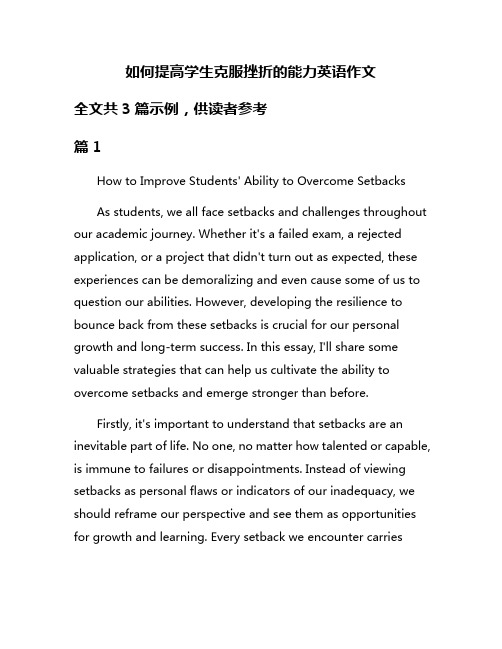
如何提高学生克服挫折的能力英语作文全文共3篇示例,供读者参考篇1How to Improve Students' Ability to Overcome SetbacksAs students, we all face setbacks and challenges throughout our academic journey. Whether it's a failed exam, a rejected application, or a project that didn't turn out as expected, these experiences can be demoralizing and even cause some of us to question our abilities. However, developing the resilience to bounce back from these setbacks is crucial for our personal growth and long-term success. In this essay, I'll share some valuable strategies that can help us cultivate the ability to overcome setbacks and emerge stronger than before.Firstly, it's important to understand that setbacks are an inevitable part of life. No one, no matter how talented or capable, is immune to failures or disappointments. Instead of viewing setbacks as personal flaws or indicators of our inadequacy, we should reframe our perspective and see them as opportunities for growth and learning. Every setback we encounter carriesvaluable lessons that can help us refine our approach, develop new skills, and better prepare us for future challenges.One effective way to overcome setbacks is to practiceself-compassion. We often tend to be our harshest critics, berating ourselves for our missteps and dwelling on our perceived shortcomings. However, this negative self-talk can be counterproductive and exacerbate feelings of stress and anxiety. Instead, we should strive to treat ourselves with kindness and understanding, recognizing that everyone makes mistakes and that setbacks are a natural part of the learning process. By cultivating self-compassion, we can reduce our emotional distress and create a more supportive environment for personal growth.Another crucial strategy is to seek support from our peers, mentors, and loved ones. Setbacks can be isolating experiences, and it's easy to feel alone in our struggles. However, by reaching out to others, we can benefit from their perspectives, advice, and encouragement. Our friends, family members, and trusted mentors can provide valuable insights, offer emotional support, and remind us of our strengths and capabilities when we're feeling discouraged.Additionally, it's essential to develop a growth mindset, which involves embracing challenges as opportunities for personal development rather than viewing them as threats to our self-worth. A growth mindset encourages us to see setbacks as temporary obstacles that can be overcome through effort, perseverance, and a willingness to learn from our mistakes. By adopting this mindset, we can cultivate a more positive and resilient attitude towards setbacks, viewing them as stepping stones to greater achievement rather than insurmountable barriers.Another powerful strategy is to engage in goal-setting and action planning. After experiencing a setback, it's important to reflect on what went wrong and identify areas for improvement. By setting specific, achievable goals and developing actionable plans to address these areas, we can regain a sense of control and direction. Breaking down our goals into smaller, manageable steps can make the process feel less overwhelming and increase our chances of success.Furthermore, we should strive to maintain a balanced perspective and avoid catastrophizing setbacks. It's easy to become consumed by our failures and magnify their importance in our minds. However, by taking a step back and consideringthe bigger picture, we can often realize that a single setback is not the end of the world and that our worth as individuals extends far beyond any one achievement or failure.Engaging in self-care practices can also play a crucial role in our ability to overcome setbacks. When we're feeling discouraged or overwhelmed, it's important to prioritize our physical and mental well-being. Activities such as exercise, mindfulness practices, hobbies, and spending time with loved ones can help us recharge our batteries and cultivate a more positive mindset.Finally, it's important to celebrate our successes, no matter how small they may seem. Acknowledging and appreciating our achievements, even in the face of setbacks, can boost our confidence and reinforce our belief in our abilities. Celebrating our wins, whether it's mastering a difficult concept, completing a challenging project, or simply persevering through a difficult period, can provide the motivation and encouragement we need to keep pushing forward.In conclusion, overcoming setbacks is an essential skill for students to develop, as it prepares us for the challenges and obstacles we'll inevitably face in our academic and professional lives. By embracing self-compassion, seeking support, cultivatinga growth mindset, engaging in goal-setting and action planning, maintaining a balanced perspective, prioritizing self-care, and celebrating our successes, we can build the resilience needed to bounce back from setbacks and continue on our path towards personal growth and achievement. Remember, setbacks are not permanent, and with the right mindset and strategies, we can emerge stronger, wiser, and better equipped to tackle whatever challenges come our way.篇2How to Improve Students' Ability to Overcome SetbacksAs students, we all face setbacks and challenges along our academic journey. From failed exams to rejections from dream universities, these obstacles can be disheartening and even demoralizing. However, it is crucial for us to develop the resilience and determination to overcome these hurdles, as they are an inevitable part of life. In this essay, I will explore various strategies that can help us cultivate this vital ability to bounce back from setbacks and continue striving towards our goals.Firstly, it is essential to adopt a growth mindset. This concept, popularized by Dr. Carol Dweck, emphasizes the belief that our abilities and intelligence can be developed through effort andperseverance. With a growth mindset, we view setbacks not as a reflection of our inherent limitations, but as opportunities for learning and improvement. When we encounter a challenge, instead of feeling defeated, we can ask ourselves, "What can I learn from this experience, and how can I approach it differently next time?" This mindset empowers us to take responsibility for our learning and growth, and to view setbacks as stepping stones towards eventual success.Secondly, developing resilience requires cultivating a strong support system. As students, we often face immense pressure and expectations, and it is crucial to have a network of people who can provide encouragement, guidance, and a listening ear. This support system can comprise our families, friends, mentors, or even professional counselors. By sharing our struggles and concerns with those who care about us, we can gain valuable perspectives, advice, and the emotional support needed to navigate through difficult times. Moreover, surrounding ourselves with positive and uplifting individuals can help counter the negative self-talk that often accompanies setbacks.Furthermore, practicing self-care is vital for maintaining our mental and emotional well-being, which in turn, enhances our ability to overcome setbacks. As students, we tend to prioritizeacademic demands over our personal needs, leading to burnout and decreased resilience. By incorporating regular exercise, adequate sleep, balanced nutrition, and enjoyable hobbies into our routines, we can replenish our energy and maintain a healthy mindset. Engaging in activities that bring us joy and a sense of accomplishment can also boost our self-confidence and provide a much-needed break from the stresses of academic life.Another strategy for overcoming setbacks is to develop effective coping mechanisms. When faced with a challenge, it is natural to experience negative emotions such as disappointment, frustration, or anxiety. However, it is crucial to manage these emotions in a healthy manner. Some effective coping techniques include journaling, practicing mindfulness or meditation, seeking professional counseling, or engaging in physical activities. By processing our emotions productively, we can prevent them from overwhelming us and clouding our judgment, enabling us to approach setbacks with a clear and rational mindset.Additionally, it is essential to maintain a balanced perspective. While academic achievements are undoubtedly important, they do not define our worth as individuals. By recognizing that our value extends beyond grades and test scores, we can develop a more well-rounded sense of self, whichcan serve as a buffer against the impact of setbacks. Engaging in extracurricular activities, pursuing personal interests, and cultivating meaningful relationships can help us maintain this balanced perspective and remind us of the multitude of aspects that contribute to a fulfilling life.Lastly, it is crucial to celebrate small victories and milestones along the way. Too often, we focus solely on the end goal, failing to acknowledge the progress and achievements that have led us to that point. By recognizing and celebrating our small successes, we can sustain our motivation, boost our confidence, and remind ourselves of our capabilities. This positive reinforcement can provide the impetus needed to persevere through future setbacks and maintain a sense of optimism and determination.In conclusion, developing the ability to overcome setbacks is an essential skill for students to cultivate. By adopting a growth mindset, building a strong support system, practicing self-care, developing effective coping mechanisms, maintaining a balanced perspective, and celebrating small victories, we can equip ourselves with the resilience and determination needed to navigate through the challenges that inevitably arise on our academic journeys. Remember, setbacks are not permanent, and with the right mindset and strategies, we can emerge strongerand more prepared to tackle future obstacles. Embrace the challenges, learn from them, and never lose sight of your goals –for it is through perseverance and resilience that we truly grow and achieve our full potential.篇3How to Improve Students' Ability to Overcome SetbacksWe've all been there – working hard on a project, spending countless hours researching and writing, only to get a disappointing grade or critical feedback. It can feel crushing, like all your efforts were for nothing. The frustration and self-doubt can make you want to give up entirely. But the ability to bounce back from setbacks is crucial, not just for academic success, but for life in general. Here are some tips that have helped me develop resilience in the face of failure.Normalize FailureOne of the biggest hurdles is getting past the mentality that failure is this horrible, shameful thing to be avoided at all costs. The truth is, failure is a normal part of the learning process. Nobody gets everything right on the first try, and if they did, they wouldn't be challenging themselves enough to grow. We needto normalize failure in academic settings and reframe it as an opportunity rather than something to be feared.Think about how many famous inventors, entrepreneurs, artists, and leaders experienced numerous failures before achieving success. Michael Jordan was cut from his high school basketball team. J.K. Rowling's first Harry Potter book was rejected by a dozen publishers before being picked up. Even Albert Einstein, one of the greatest scientific minds ever, was once told he'd never amount to anything. Failure is inevitable, but it's how you respond that determines your success.Have a Growth MindsetSpeaking of Einstein, he embodied what psychologist Carol Dweck calls a "growth mindset" – the belief that intelligence and abilities can be developed through effort and perseverance. The opposite is a "fixed mindset" where you think your talents are set in stone.When you have a growth mindset, setbacks don't define you as a failure. They're just temporary obstacles to overcome through harder work, better strategies, and learning from mistakes. Each failure provides valuable feedback on what to improve for next time.With a fixed mindset, poor performance is seen as a lack of innate ability. This makes failures deeply demoralizing and likely to cause people to give up. By developing a growth mindset, we become more resilient and view challenges as opportunities to stretch our abilities.Build a Support SystemIt's tough to stay motivated and positive when you're struggling alone. Having people in your corner who believe in you can make a huge difference.For me, my family has always been an incredible support system, cheering me on through the highs and lows. When I've felt crushed by disappointment, my parents reminded me how capable I am and that one setback doesn't define me. Surrounding yourself with positive people who see your potential can pull you out of a defeatist mindset.Friends can be another invaluable source of moral support and can relate to academic stresses. You can vent to each other, swap study tips, and keep each other accountable. Having a reliable crew to turn to can boost morale and providemuch-needed perspective.Teachers and mentors can also play a key role. Don't be afraid to reach out when you're feeling discouraged. The best ones want to see you succeed and may offer guidance you hadn't considered.Develop Healthy Coping StrategiesWe all have our own ways of coping with stress and disappointment, some healthier than others. Personally, I've found practices like exercise, meditation, journaling, and talking things out with friends to be most effective for managing difficult emotions.Exercise is a great way to blow off steam, boost endorphins, and gain a sense of control during turbulent times. Getting your body moving, whether it's hitting the gym, going for a run, or cycling, can provide a mental reset.Meditation has also become a go-to tool for me when I'm feeling overwhelmed or self-critical. Taking 10-15 minutes daily to just breathe, clear my mind, and be present in the moment really centers me. It helps me avoid ruminating over failures and refocus on my goals.Journaling likewise provides an outlet to process emotions, track progress, celebrate small wins, and maintain perspective.Looking back at earlier entries often reminds me how I overcame past obstacles, renewing my determination.Other coping methods like listening to music, spending time outdoors, comedy shows, or creative hobbies can also help alleviate stress in a healthy way. Having positive diversions and "recharge" activities is important for resilience.Learn from CriticismWhen we receive criticism, it can sting, triggering feelings of defensiveness or self-doubt. But criticism, no matter how harshly delivered, is a gift if we choose to hear it. It shines a light on our blind spots and areas for improvement.Rather than reflexively justifying yourself or dismissing feedback as unfair, take a step back. Really listen to what's being said with an open mind. Often, critiques contain nuggets of truth that are hard for us to see ourselves. Use the feedback to develop an action plan for addressing weaknesses or mistakes the next opportunity you get.In the classroom setting, I've found the best approach is to view teachers not as adversaries, but as invested coaches eager to see you reach your potential. That's why they take the time to provide constructive criticism – to fuel your learning and growth.Keep the Big Picture in MindWhen you're in the trenches, struggling over a daunting assignment or deflated after a poor grade, it's easy to get bogged down by the stress of the moment. But stepping back and maintaining perspective on your larger goals can reignite motivation and prevent you from getting derailed by temporary setbacks.For example, if your goal is getting into a top university program, remind yourself that one bad grade is just a small bump in the road of a years-long journey. Equally important, setbacks build character, persistence, and valuable skills like time management, prioritization, and overcoming adversity that will serve you well in the future.Looking further down the road, think about how developing resilience in the face of academic challenges can translate to the professional world. Every job and career has its share of stresses, rejections, made deadlines, or less-than-perfect performances. Gaining tools and mindsets to bounce back from setbacks now is invaluable preparation to become a successful, adaptable professional.Moving ForwardWe all want to succeed academically, but the path is rarely a straight line. There will be obstacles, failures, and disappointments along the way. What separates those who reach their goals from those who get derailed is resilience – the ability to weather storms, adapt, and press on.By normalizing failure as part of growth, developing a growth mindset, building a support network, practicing healthy coping methods, learning from criticism, and keeping our eyes on the bigger picture, we can all boost our determination and grit. Failure doesn't have to hold you back. In fact, overcoming it can be the best motivator to achieve more than you ever thought possible.。
[英语四级作文]2014年英语四级作文范文:挫折教育
![[英语四级作文]2014年英语四级作文范文:挫折教育](https://img.taocdn.com/s3/m/bda611b3bd64783e09122b9b.png)
下面是2014年英语四级作文范文:挫折教育,希望考生了解四级范文的写作思路,增强自己的写作实力。
作文话题: Directions: For this part, you are allowed 30 minutes to write a composition on the topic Frustration Education should be Strengthened among College Students. You should write at least 120 words, and base your composition on the outline: 1)加强挫折教育十分重要, 2)举例说明你的观点, 3)为了加强挫折教育,我们应该…… 范文: Frustration Education should be Strengthened among College Students It is universally acknowledged that college students should be guided correctly to face frustrations in life. Frustration is inevitable during our life, and frustration education should be carried out among colleges and universities. The truth of it is deep and profound. A great many remarkable illustrations contribute to this argument. A case in point is that there are an increasing number of college students committing suicide each year when confronted with some kind of frustration. This is close to suggest that strengthening frustration education allows of no delay. As a matter of fact, it seems that successful people tend to be good at dealing with frustrations. Moreover, most of the students are often annoyed and discouraged by frustrations instead of drawing lessons. Judging from the evidence offered, we might safely draw the conclusion that frustration education is essential to the college students. But what is worth noting is colleges should also provide psychological service for the students while giving frustration education. To conclude, college students should be guided in the right path when facing setbacks in life. 参考译文: 普遍公认我们应该正确引导大学生面对生活中的挫折。
2020年英语四级作文范文:挫折教育
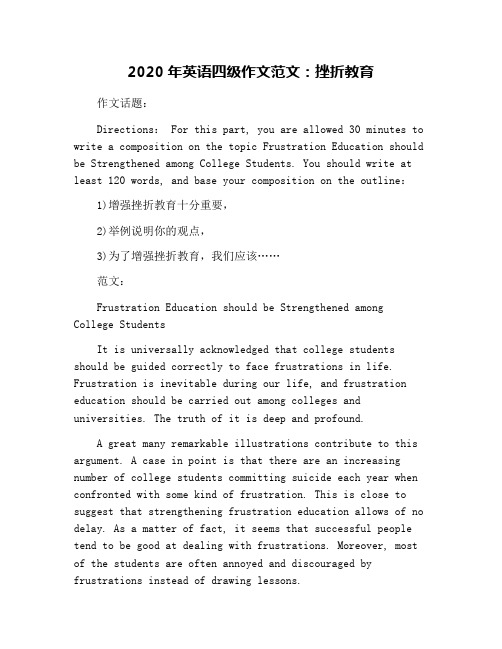
2020年英语四级作文范文:挫折教育作文话题:Directions: For this part, you are allowed 30 minutes to write a composition on the topic Frustration Education should be Strengthened among College Students. You should write at least 120 words, and base your composition on the outline:1)增强挫折教育十分重要,2)举例说明你的观点,3)为了增强挫折教育,我们应该……范文:Frustration Education should be Strengthened among College StudentsIt is universally acknowledged that college students should be guided correctly to face frustrations in life. Frustration is inevitable during our life, and frustration education should be carried out among colleges and universities. The truth of it is deep and profound.A great many remarkable illustrations contribute to this argument. A case in point is that there are an increasing number of college students committing suicide each year when confronted with some kind of frustration. This is close to suggest that strengthening frustration education allows of no delay. As a matter of fact, it seems that successful people tend to be good at dealing with frustrations. Moreover, most of the students are often annoyed and discouraged by frustrations instead of drawing lessons.Judging from the evidence offered, we might safely drawthe conclusion that frustration education is essential to the college students. But what is worth noting is colleges should also provide psychological service for the students while giving frustration education. To conclude, college students should be guided in the right path when facing setbacks in life.参考译文:普遍公认我们应该准确引导大学生面对生活中的挫折。
如何加强挫折教育英语作
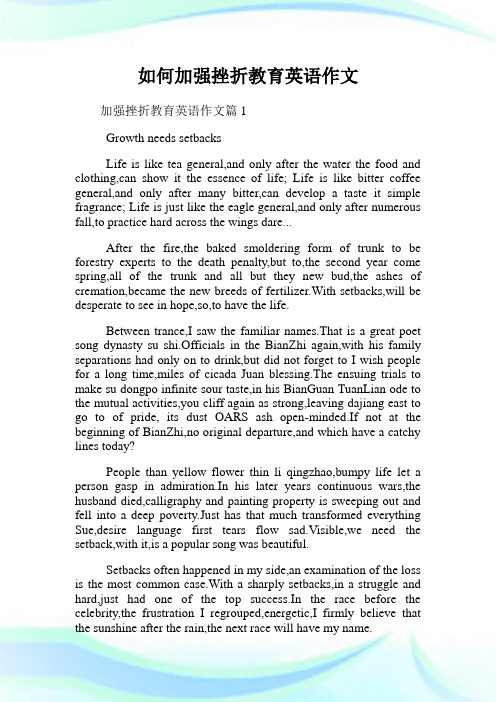
如何加强挫折教育英语作文加强挫折教育英语作文篇1Growth needs setbacksLife is like tea general,and only after the water the food and clothing,can show it the essence of life; Life is like bitter coffee general,and only after many bitter,can develop a taste it simple fragrance; Life is just like the eagle general,and only after numerous fall,to practice hard across the wings dare...After the fire,the baked smoldering form of trunk to be forestry experts to the death penalty,but to,the second year come spring,all of the trunk and all but they new bud,the ashes of cremation,became the new breeds of fertilizer.With setbacks,will be desperate to see in hope,so,to have the life.Between trance,I saw the familiar names.That is a great poet song dynasty su shi.Officials in the BianZhi again,with his family separations had only on to drink,but did not forget to I wish people for a long time,miles of cicada Juan blessing.The ensuing trials to make su dongpo infinite sour taste,in his BianGuan TuanLian ode to the mutual activities,you cliff again as strong,leaving dajiang east to go to of pride, its dust OARS ash open-minded.If not at the beginning of BianZhi,no original departure,and which have a catchy lines today?People than yellow flower thin li qingzhao,bumpy life let a person gasp in admiration.In his later years continuous wars,the husband died,calligraphy and painting property is sweeping out and fell into a deep poverty.Just has that much transformed everything Sue,desire language first tears flow sad.Visible,we need the setback,with it,is a popular song was beautiful.Setbacks often happened in my side,an examination of the loss is the most common case.With a sharply setbacks,in a struggle and hard,just had one of the top success.In the race before the celebrity,the frustration I regrouped,energetic,I firmly believe that the sunshine after the rain,the next race will have my name.Setbacks will grow up together,but pain is the prelude of success .Meet suffering are necessary,do not experience the storm how to see rainbow,no one can casually succeed加强挫折教育英语作文篇2作文话题:Directions: For this part, you are allowed 30 minutes to write a composition on the topic Frustration Education should be Strengthened among College Students. You should write at least 120 words, and base your composition on the outline:1)加强挫折教育十分重要,2)举例说明你的观点,3)为了加强挫折教育,我们应该范文:Frustration Education should be Strengthened among College StudentsIt is universally acknowledged that college students should be guided correctly to face frustrations in life. Frustration is inevitable during our life, and frustration education should be carried out among colleges and universities. The truth of it is deep and profound.A great many remarkable illustrations contribute to this argument. A case in point is that there are an increasing number of college students committing suicide each year when confronted with some kind of frustration. This is close to suggest that strengthening frustration education allows of no delay. As a matter of fact, it seems that successful people tend to be good at dealing with frustrations. Moreover, most of the students are often annoyed and discouraged by frustrations instead of drawing lessons.Judging from the evidence offered, we might safely draw the conclusion that frustration education is essential to the collegestudents. But what is worth noting is colleges should also provide psychological service for the students while giving frustration education. To conclude, college students should be guided in the right path when facing setbacks in life.参考译文:普遍公认我们应该正确引导大学生面对生活中的挫折。
挫折教育的英语作文
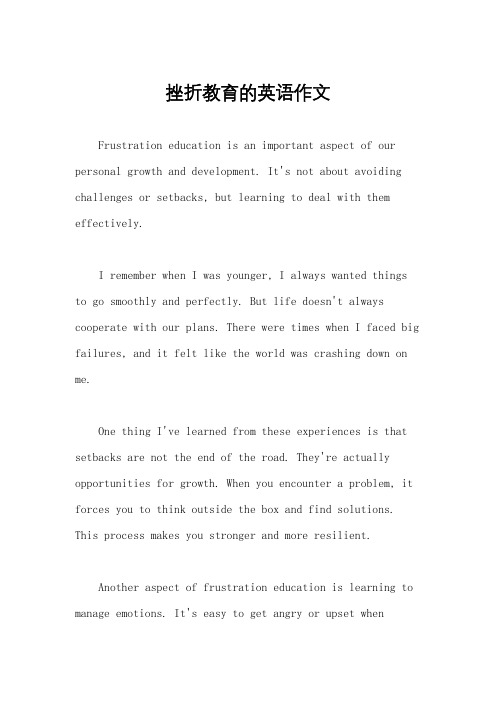
挫折教育的英语作文Frustration education is an important aspect of our personal growth and development. It's not about avoiding challenges or setbacks, but learning to deal with them effectively.I remember when I was younger, I always wanted things to go smoothly and perfectly. But life doesn't always cooperate with our plans. There were times when I faced big failures, and it felt like the world was crashing down on me.One thing I've learned from these experiences is that setbacks are not the end of the road. They're actually opportunities for growth. When you encounter a problem, it forces you to think outside the box and find solutions. This process makes you stronger and more resilient.Another aspect of frustration education is learning to manage emotions. It's easy to get angry or upset whenthings don't go as planned. But it's crucial to stay calm and focused, so you can make rational decisions. I've found that taking a step back and breathing deeply can help me clear my head and see things more objectively.Finally, frustration education also teaches us the value of perseverance. Sometimes, achieving our goals takes time and effort. We may encounter roadblocks or obstacles that seem。
应该加强学生的挫折意识英文作文
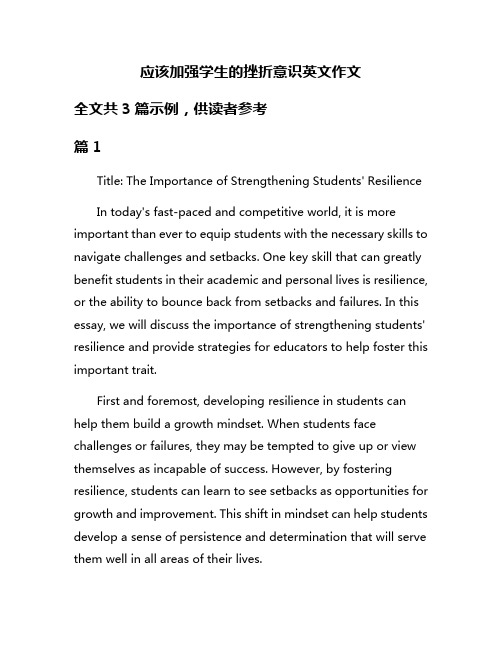
应该加强学生的挫折意识英文作文全文共3篇示例,供读者参考篇1Title: The Importance of Strengthening Students' ResilienceIn today's fast-paced and competitive world, it is more important than ever to equip students with the necessary skills to navigate challenges and setbacks. One key skill that can greatly benefit students in their academic and personal lives is resilience, or the ability to bounce back from setbacks and failures. In this essay, we will discuss the importance of strengthening students' resilience and provide strategies for educators to help foster this important trait.First and foremost, developing resilience in students can help them build a growth mindset. When students face challenges or failures, they may be tempted to give up or view themselves as incapable of success. However, by fostering resilience, students can learn to see setbacks as opportunities for growth and improvement. This shift in mindset can help students develop a sense of persistence and determination that will serve them well in all areas of their lives.Additionally, resilience can help students cope with stress and anxiety. In today's high-pressure academic environment, students often feel overwhelmed by the demands placed upon them. By developing resilience, students can learn to manage stress more effectively and bounce back from difficult situations with greater ease. This can not only improve students' mental health and well-being but also enhance their academic performance.Moreover, resilience is a key factor in building students' self-confidence and self-esteem. When students face challenges and setbacks and are able to overcome them, they develop a sense of accomplishment and pride in their abilities. This can help students build a strong sense of self-worth and confidence in their own abilities, which can benefit them in all areas of their lives.So, how can educators help students develop resilience? One important strategy is to provide students with opportunities to face challenges and setbacks in a supportive and nurturing environment. Encouraging students to take risks and try new things, even if they may fail, can help them develop the resilience to persevere in the face of adversity. Additionally, providing students with positive feedback and encouragement when theydo face setbacks can help them build confidence in their ability to overcome challenges.In conclusion, strengthening students' resilience is essential for their personal and academic success. By developing resilience, students can build a growth mindset, cope with stress and anxiety, and build confidence in their abilities. Educators play a crucial role in fostering resilience in students by providing them with opportunities to face challenges and setbacks and offering them support and encouragement along the way. By prioritizing the development of resilience in students, educators can help them thrive in today's fast-paced and competitive world.篇2Strengthening Students' ResilienceIn today's fast-paced and competitive world, students are often faced with challenges and setbacks that can easily lead to feelings of hopelessness and helplessness. This is why it is crucial to strengthen students' resilience and foster a positive mindset that can help them overcome obstacles and bounce back from failures.Resilience is the ability to adapt and bounce back from adversity, trauma, tragedy, threats, or stress. It is a key trait thatenables individuals to cope with difficult situations and persevere in the face of setbacks. By teaching students how to build their resilience, we can empower them to navigate through the ups and downs of life with confidence and optimism.One way to enhance students' resilience is by cultivating a growth mindset. This involves teaching students to view challenges as opportunities for growth and learning, rather than insurmountable obstacles. By encouraging students to embrace challenges and see failures as stepping stones to success, we can help them develop a positive attitude towards setbacks and setbacks.Another important aspect of strengthening students' resilience is teaching them coping skills to deal with stress and adversity. This includes techniques such as mindfulness, relaxation exercises, and positive self-talk, which can help students manage their emotions and stay calm under pressure. By providing students with these tools, we can help them develop the resilience they need to overcome challenges and persevere in the face of adversity.It is also important to foster a supportive and nurturing environment that encourages students to take risks and make mistakes. By creating a safe space where students feel free to trynew things and learn from their failures, we can help them develop the resilience they need to navigate through life's ups and downs with confidence and resilience.In conclusion, strengthening students' resilience is crucial for their emotional well-being and success in life. By teaching students how to build their resilience and cope with setbacks, we can empower them to overcome challenges and persevere in the face of adversity. By fostering a growth mindset, teaching coping skills, and creating a supportive environment, we can help students develop the resilience they need to thrive in today's fast-paced and competitive world.篇3Title: Strengthening Students' ResilienceIn the fast-paced and competitive world we live in today, it is more important than ever for students to develop a strong sense of resilience in the face of challenges and setbacks. Resilience, or the ability to bounce back from adversity and learn from failures, is a key factor in achieving success both academically and in life. Therefore, it is crucial for schools and educators to actively work towards strengthening students' resilience.One of the main reasons why it is important to strengthen students' resilience is that it helps them develop a growth mindset. A growth mindset is the belief that abilities and intelligence can be developed through hard work, perseverance, and learning from failures. When students have a growth mindset, they are more likely to take on challenges, push themselves out of their comfort zones, and view failures as opportunities for growth rather than signs of incapability.Furthermore, resilience helps students better cope with stress and pressure. In today's high-pressure academic environment, students often face a great deal of stress and anxiety. By developing resilience, students are better equipped to handle stress in a healthy way, which can improve their overall well-being and mental health. Resilient students are also less likely to give up when facing difficulties, as they have the strength and determination to persevere and overcome obstacles.In addition, resilience fosters independence and self-reliance in students. When students are resilient, they are more likely to take initiative, set goals for themselves, and work towards achieving those goals independently. This can help studentsbecome more self-motivated and proactive in their learning, leading to greater academic success.So, how can educators and schools help strengthen students' resilience? One way is to foster a supportive and encouraging learning environment. Teachers can praise effort and perseverance rather than just focusing on grades, and provide opportunities for students to challenge themselves and learn from mistakes. Schools can also offer counseling services and resources for students to help them cope with stress and build resilience.Additionally, educators can incorporate resilience-building activities and lessons into the curriculum. For example, teachers can teach students about famous figures who have overcome adversity and achieved success, and encourage students to reflect on their own strengths and abilities. Schools can also offer workshops and seminars on stress management, mindfulness, and other techniques for building resilience.In conclusion, strengthening students' resilience is essential for their academic success and overall well-being. By helping students develop a growth mindset, cope with stress, and become more independent learners, educators can empower students to face challenges head on and thrive in today'scompetitive world. It is up to schools and educators to prioritize resilience-building in their curricula and create a supportive environment where students can develop the skills they need to succeed.。
加强大学生挫折教育英语作文
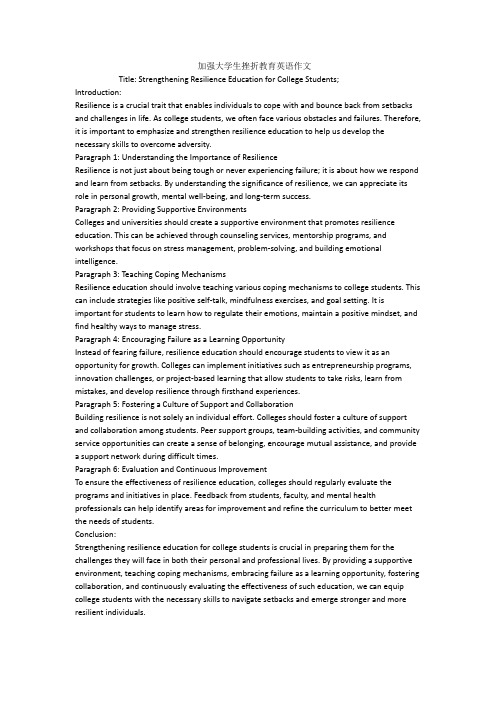
加强大学生挫折教育英语作文Title: Strengthening Resilience Education for College Students;Introduction:Resilience is a crucial trait that enables individuals to cope with and bounce back from setbacks and challenges in life. As college students, we often face various obstacles and failures. Therefore, it is important to emphasize and strengthen resilience education to help us develop the necessary skills to overcome adversity.Paragraph 1: Understanding the Importance of ResilienceResilience is not just about being tough or never experiencing failure; it is about how we respond and learn from setbacks. By understanding the significance of resilience, we can appreciate its role in personal growth, mental well-being, and long-term success.Paragraph 2: Providing Supportive EnvironmentsColleges and universities should create a supportive environment that promotes resilience education. This can be achieved through counseling services, mentorship programs, and workshops that focus on stress management, problem-solving, and building emotional intelligence.Paragraph 3: Teaching Coping MechanismsResilience education should involve teaching various coping mechanisms to college students. This can include strategies like positive self-talk, mindfulness exercises, and goal setting. It is important for students to learn how to regulate their emotions, maintain a positive mindset, and find healthy ways to manage stress.Paragraph 4: Encouraging Failure as a Learning OpportunityInstead of fearing failure, resilience education should encourage students to view it as an opportunity for growth. Colleges can implement initiatives such as entrepreneurship programs, innovation challenges, or project-based learning that allow students to take risks, learn from mistakes, and develop resilience through firsthand experiences.Paragraph 5: Fostering a Culture of Support and CollaborationBuilding resilience is not solely an individual effort. Colleges should foster a culture of support and collaboration among students. Peer support groups, team-building activities, and community service opportunities can create a sense of belonging, encourage mutual assistance, and provide a support network during difficult times.Paragraph 6: Evaluation and Continuous ImprovementTo ensure the effectiveness of resilience education, colleges should regularly evaluate the programs and initiatives in place. Feedback from students, faculty, and mental health professionals can help identify areas for improvement and refine the curriculum to better meet the needs of students.Conclusion:Strengthening resilience education for college students is crucial in preparing them for the challenges they will face in both their personal and professional lives. By providing a supportive environment, teaching coping mechanisms, embracing failure as a learning opportunity, fostering collaboration, and continuously evaluating the effectiveness of such education, we can equip college students with the necessary skills to navigate setbacks and emerge stronger and more resilient individuals.。
挫折教育对大学生的重要性英语作文
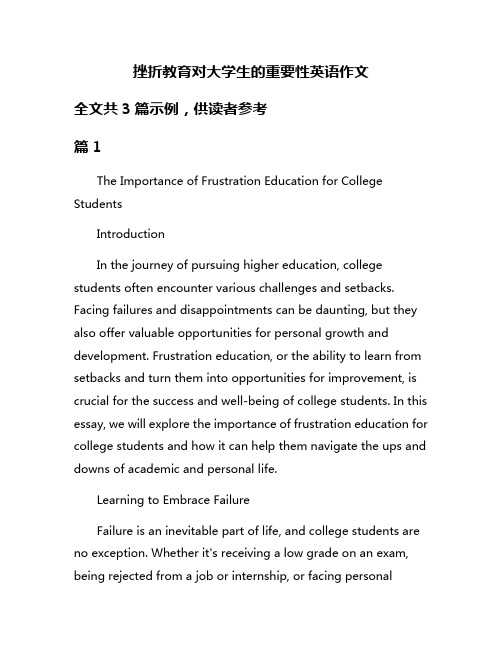
挫折教育对大学生的重要性英语作文全文共3篇示例,供读者参考篇1The Importance of Frustration Education for College StudentsIntroductionIn the journey of pursuing higher education, college students often encounter various challenges and setbacks. Facing failures and disappointments can be daunting, but they also offer valuable opportunities for personal growth and development. Frustration education, or the ability to learn from setbacks and turn them into opportunities for improvement, is crucial for the success and well-being of college students. In this essay, we will explore the importance of frustration education for college students and how it can help them navigate the ups and downs of academic and personal life.Learning to Embrace FailureFailure is an inevitable part of life, and college students are no exception. Whether it's receiving a low grade on an exam, being rejected from a job or internship, or facing personalchallenges, setbacks can leave students feeling discouraged and defeated. However, instead of viewing failure as a final outcome, frustration education encourages students to see it as a learning experience. By reframing failure as an opportunity for growth and self-improvement, students can cultivate resilience and develop the confidence to tackle future challenges.Building Resilience and GritResilience and grit are essential qualities that enable individuals to persevere in the face of adversity. Frustration education helps college students develop these qualities by teaching them how to bounce back from setbacks and setbacks stronger than before. By embracing failure as a natural part of the learning process, students can build resilience and grit, which are vital for success in academics, career, and personal life. Through persistence and determination, students can overcome obstacles and achieve their goals, no matter how insurmountable they may seem.Fostering Self-awareness and Self-reflectionFrustration education also encourages college students to cultivate self-awareness and self-reflection. By reflecting on their strengths and weaknesses, as well as their past successes and failures, students can gain a deeper understanding of themselvesand their motivations. This self-awareness allows students to identify areas for improvement and set realistic goals for themselves. Through self-reflection, students can learn from their mistakes, make better decisions, and ultimately achieve greater success in their academic and personal endeavors.Promoting a Growth MindsetA growth mindset is the belief that intelligence and abilities can be developed through effort, perseverance, and learning. Frustration education promotes a growth mindset by encouraging college students to view challenges as opportunities for growth and improvement. Instead of seeing setbacks as a reflection of their inherent abilities, students with a growth mindset see them as temporary obstacles that can be overcome with hard work and determination. By fostering a growth mindset, frustration education empowers students to take risks, embrace new opportunities, and strive for excellence in all aspects of their lives.ConclusionIn conclusion, frustration education plays a crucial role in the personal and academic development of college students. By learning to embrace failure, build resilience and grit, fosterself-awareness and self-reflection, and promote a growthmindset, students can navigate the challenges of higher education with confidence and determination. As educators and mentors, it is important to instill in students the value of frustration education and provide them with the tools and support they need to succeed. By equipping students with the skills and mindset to turn setbacks into opportunities for growth, we can empower them to achieve their full potential and thrive in the face of adversity.篇2The Importance of Teaching Resilience to College StudentsIntroductionCollege is a time of growth, learning, and self-discovery for many young adults. However, it is also a time of challenges and setbacks. The transition from high school to college can be overwhelming, and students often face academic, social, and personal challenges that can be difficult to navigate. In order to succeed in college and beyond, students need to develop resilience - the ability to bounce back from adversity, learn from failure, and keep moving forward. This essay will discuss the importance of teaching resilience to college students andprovide strategies for educators to help students develop this crucial skill.The Importance of ResilienceResilience is a key factor in academic success, personalwell-being, and overall happiness. Research has shown that students who are resilient are better able to handle stress, setbacks, and disappointment. They are more likely to persevere in the face of challenges, take risks, and try new things. Resilient individuals are also better equipped to cope with failure and learn from their mistakes. In short, resilience is a crucial skill that can help students thrive in college and beyond.Teaching ResilienceThere are several strategies that educators can use to help students develop resilience. One approach is to create a supportive and nurturing learning environment. Students need to feel safe and valued in order to take risks and learn from their mistakes. Educators can foster resilience by providing encouragement, constructive feedback, and opportunities for growth. They can also help students develop a growth mindset - the belief that their abilities can be developed through hard work and effort.Another strategy for teaching resilience is to model resilience in the classroom. Educators can share their own experiences of overcoming challenges and setbacks, and provide examples of how resilience has helped them succeed. By demonstrating resilience, educators can inspire students to develop this crucial skill for themselves. Educators can also help students develop coping strategies for managing stress and building resilience. This may include teaching students mindfulness techniques, stress management skills, andgoal-setting strategies. By equipping students with the tools they need to cope with adversity, educators can help them thrive in college and beyond.ConclusionIn conclusion, resilience is a crucial skill that can help college students succeed academically, personally, and professionally. By teaching resilience, educators can help students develop the ability to bounce back from adversity, learn from failure, and keep moving forward. By creating a supportive learning environment, modeling resilience, and equipping students with coping strategies, educators can help students thrive in college and beyond. Developing resilience is an ongoing process, butwith the right support and guidance, students can learn to overcome challenges and achieve their goals.篇3The Importance of Adversity Education for College StudentsAdversity education, also known as setback education, is an essential aspect of a student's growth and development. It teaches them resilience, determination, and the ability to overcome challenges. In the fast-paced and competitive world of academia, college students often face a variety of setbacks and obstacles. These can range from academic struggles, personal issues, to career challenges. However, it is how they respond to these setbacks that will ultimately shape their future success.One of the key benefits of adversity education is that it teaches students to develop grit and perseverance. Through facing obstacles and setbacks, students learn to push through difficult situations and not give up easily. This resilience is crucial in helping students navigate the ups and downs of college life and beyond. It also cultivates a sense of determination and drive that will serve them well in their future careers.Furthermore, adversity education helps students develop problem-solving skills. When faced with a setback, students areforced to think critically and come up with creative solutions to overcome the challenge. This process of problem-solving can help them develop key skills such as critical thinking, innovation, and adaptability. These are essential skills that will enable them to thrive in the ever-changing world of work.In addition, adversity education also helps students build emotional intelligence. By facing setbacks, students learn to manage their emotions and develop resilience in the face of adversity. This emotional maturity is crucial in helping them maintain a positive mindset and navigate the challenges of college life. It also helps them build strong relationships and effective communication skills, which are essential in succeeding in a team environment and building a successful career.Moreover, adversity education teaches students the important lesson of failure. In a culture that often celebrates success and achievement, students can be afraid of failure and avoid taking risks. However, setbacks and failures are an inevitable part of life, and learning to embrace failure and learn from it is crucial for personal growth and development. By experiencing setbacks, students learn to see failure as a valuable learning opportunity and not a permanent roadblock.In conclusion, adversity education plays a vital role in shaping the growth and development of college students. It teaches them resilience, determination, problem-solving skills, emotional intelligence, and the important lesson of failure. By facing setbacks and challenges head-on, students learn valuable life lessons that will serve them well in their academic, personal, and professional endeavors. Therefore, it is essential that educators and institutions prioritize adversity education in the curriculum to prepare students for the challenges of the future.。
- 1、下载文档前请自行甄别文档内容的完整性,平台不提供额外的编辑、内容补充、找答案等附加服务。
- 2、"仅部分预览"的文档,不可在线预览部分如存在完整性等问题,可反馈申请退款(可完整预览的文档不适用该条件!)。
- 3、如文档侵犯您的权益,请联系客服反馈,我们会尽快为您处理(人工客服工作时间:9:00-18:30)。
关于应该加强大学生的挫折教育
挫折教育应加强大学生
要引导大学生正确地面对生活,这已被普遍接受挫折。
挫折是不可避免的在我们的生活,应该进行挫折教育学院和大学之间进行。
它的忠实深厚而深刻的。
许多声名显赫的例子有助于这一论点。
一个典型的例子是,有一个高校学生每年自杀人数增加时,遇到一些挫折的一种。
这是近建议,加强挫折教育不拖延允许。
又例如,它似乎成功的人往往在处理好与挫折。
此外,大部分学生往往烦恼和挫折中吸取教训,而不是气馁。
从所提供的证据来看,我们可能不难得出这样的结论:挫折教育是必不可少的大学生。
但值得注意的是高校也应为学生提供心理服务,同时给予挫折教育。
总括而言,高校要引导学生在正确的道路,面对生活中的挫折。
——文章来源网,仅供分享学习参考~ 1 ~。
